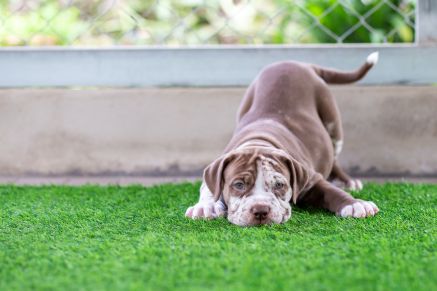Why on earth would a dog eat an ant trap? There are many answers to this question depending on who you ask. It could be because they’re curious about the object. They may like to see if it’s edible or if it could be a toy. No matter the reason your fur baby has chosen to eat an ant trap, there are some things you’ll need to know.
Connect with a verified veterinarian in minutes. Licensed vets are available 24/7 to answer your questions. No need to worry about your furry family member.
My Dog Ate an Ant Trap—Is this a Medical Emergency?
In most cases, ant traps contain ingredients that are only slightly toxic to dogs. Even if a small dog eats the trap, it’s unlikely he’ll suffer any ill effects due to the poison.
If your precious pup was only sniffing at and nosing the trap, he should be OK. However, remember these traps are usually made with a plastic housing. If your canine companion happens to eat a portion of a trap, or the entire thing, you could be facing a possible medical emergency.
Eating the Entire Trap Could Lead to Intestinal Blockage
The reason is because the hard plastic can become lodged in a dog’s intestines, causing a blockage which is a medical emergency.
Even if your fur baby only swallows a small piece, that piece could be sharp, which could cause damage to the dog’s esophagus and other parts of the digestive system.

Review symptoms, medications & behavior to keep your pets healthy with a Vet Online in just minutes.
Ask a Vet Live NowWhat to Do If Your Dog Eats an Ant Trap
If you know for sure that your dog has eaten a portion of the trap, then you can monitor his health to see if he suffers any ill effects. Watch for these symptoms:
- Diarrhea
- Vomiting
- Drooling excessively
- Nausea
These symptoms are signs your dog is having a reaction to the chemicals in the ant trap. Most of the time, these symptoms will only last a few hours to a day or so. After this, he should be OK.
Chances are if he swallowed only a small piece, this would eventually pass through your dog’s digestive tract in 2-3 days. To help the plastic piece pass, it’s OK to feed your fur baby some canned pumpkin (not pumpkin pie filling), mashed potatoes or even pieces of bread. These will entrap the plastic piece and help it to pass without causing damage to the digestive tract.
On the other hand, if you know for sure your dog ate the entire trap, this could cause a bowel obstruction, which can be life threatening. Signs your fur baby could have a blocked intestine include:
- Diarrhea
- Vomiting
- Straining (to pass poo)
- Abdominal bloating and pain
- Bloody stools
- Looking anxious or panicked
If your dog is showing any of these symptoms, then it’s time to call the vet immediately. If the ant trap is blocking your canine companion’s intestines, then he will need treatment as soon as possible.
To sum it all up, in most cases, the poison in the ant trap isn’t highly toxic to dogs. Even small dogs should be OK if they swallow the entire bate. However, if your fur baby has swallowed any of the plastic housing of the trap, then you’ll need to monitor his health for any of the signs and symptoms above. If you suspect your dog has an intestinal blockage, then please call the vet immediately.
Connect with a verified veterinarian in minutes. Licensed vets are available 24/7 to answer your questions. No need to worry about your furry family member.

Julie
Julie is a graduate of the University of North Carolina, Wilmington, where she studied Animal science. Though contrary to the opinion of her parents she was meant to study pharmacy, but she was in love with animals especially cats. Julie currently works in an animal research institute (NGO) in California and loves spending quality time with her little cat. She has the passion for making research about animals, how they survive, their way of life among others and publishes it. Julie is also happily married with two kids.
Review symptoms, medications & behavior to keep your pets healthy with a Vet Online in just minutes.
Ask a Vet Live Now




